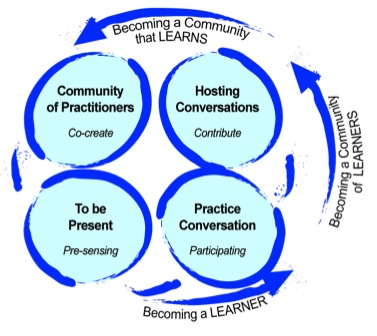The Four Fold Practice Of The Art Of Hosting
The Four Fold PracticeWe have learned that quality conversations leading to close team work and wise action arise when there are four conditions present.
1. Be Present 2. Participate and practice conversations 3. Host 4. Co-create We call these four conditions the Four Fold Way of Hosting, because you can practice these any time. They form the basis for all good hosting. Be Present ...host yourself first - be willing to sit in the chaos - keep the space open - sit in the fire of the present... Being present means showing up, undistracted, prepared, clear about the need and what your personal contribution can be. It allows you to check in with yourself and develop the personal practice of curiosity about the outcomes of any gathering. Presence means making space to devote a dedicated time to working with others. If you are distracted, called out or otherwise located in many different places, you cannot be present in one. For meetings to have deep results, every person in the room should be fully present. Collectively, it is good practice to become present together as a meeting begins This might be as simple as taking a moment of silence to rest into the present. If an Elder is present, a prayer does this very nicely. Invite a collective slowing down so that all participants in a meeting can be present together. Participate and practice conversation ...be willing to listen fully, respectfully, without judgement and thinking you already know all the answer – practice conversation mindfully... Conversation is an art, it is not just talk. It demands that we listen carefully to one another and that we offer what we can in the service of the whole. Curiosity and judgement cannot live together in the same space. If we are judging what we are hearing, we cannot be curious about the outcome, and if we have called a meeting because we are uncertain of the way forward, being open is a key skill and capacity. Only by practising skilful conversation can we find our best practice together. If we practice conversation mindfully we might slow down meetings so that wisdom and clarity can work quickly. When we talk mindlessly, we don't allow space for the clarity to arise. The art of conversation is the art of slowing down to speed up. Host conversations ...be courageous, inviting and willing to initiate conversations that matter - find and host powerful questions with the stakeholders – and then make sure you harvest the answers, the patterns, insights learnings and wise actions... Hosting conversations is both more and less than facilitating. It means taking responsibility for creating and holding the container in which a group of people can do their best work together. You can create this container using the seven helpers as starting points, and although you can also do this in the moment, the more preparation you have the better. The bare minimum to do is to discern the need, prepare a question and know what you will do with the harvest. If there is no need to meet, don't meet. If there is a need get clear on the need and prepare a process that will meet that need by asking a powerful question. And always know how you will harvest and what will be done with that harvest, to ensure that results are sustainable and the effort was worth it. Hosting conversations takes courage and it takes a bit of certainty and faith in your people. We sometimes give short shrift to conversational spaces because of the fear we experience in stepping up to host. It is, however, a gift to host a group and it is a gift to be hosted well. Work in meetings becomes that much better. Co-create ...be willing to co create and co-host with others, blending your knowing, experience and practices with theirs, working partnership.. The fourth practice is about showing up in a conversation without being a spectator, and contributing to the collective effort to sustain results. The best conversations arise when we listen for what is in the middle, what is arising out of the centre of our collaboration. It is not about the balancing of individual agendas, it is about finding out what is new. And when that is discovered work unfolds beautifully when everyone is clear about what they can contribute to the work. This is how results become sustainable over time – they fall into the network of relationships that arise from a good conversation, from friends working together. So contribute what you know to the mix so that patterns may become clear and the collaborative field can produce unexpected and surprising results. |


